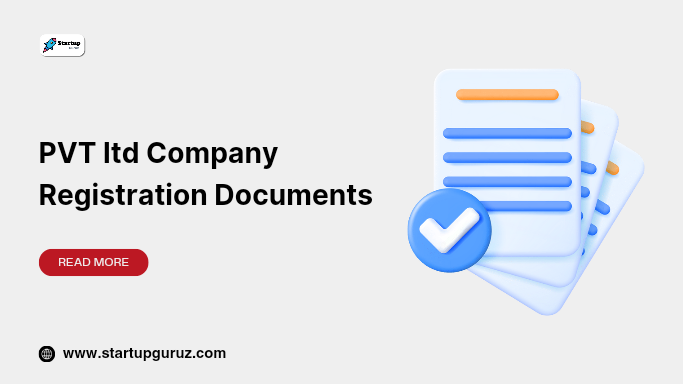PVT ltd Company Registration Documents
Private Limited Company Registration: A Comprehensive Guide
Introduction
In today’s dynamic business environment, choosing the right structure for your enterprise is crucial. One of the most popular options is registering a Private Limited Company (PLC). This comprehensive guide is designed to walk you through the process, documents needed, and common questions related to Pvt Ltd Company registration.

Table of Contents
Introduction to Pvt Ltd Company
- Definition and Features: Understand the fundamental characteristics that distinguish a Pvt Ltd Company, such as limited liability, perpetual succession, and a separate legal entity.
- Advantages and Disadvantages: Explore the benefits, like limited liability protection for shareholders, and potential drawbacks associated with Pvt Ltd Companies.
Why Opt for Pvt Ltd Company Registration?
- Limited Liability Protection: Learn how shareholders’ liability is limited to their share capital, safeguarding personal assets.
- Separate Legal Entity: Understand the concept of the company as a distinct legal entity, capable of owning assets and incurring debts independently.
- Perpetual Succession: Explore the perpetual existence of the Pvt Ltd Company, unaffected by changes in shareholders or directors.
Step-by-Step Guide to Pvt Ltd Company Registration
- Pre-Incorporation Requirements: Understand the groundwork needed, such as selecting a unique company name and defining the scope of business.
- Name Reservation: Learn about the process of reserving a name for your company through the Ministry of Corporate Affairs (MCA).
- Obtaining Director Identification Number (DIN): Explore the significance of DIN for directors and the procedure for its acquisition.
- Digital Signature Certificate (DSC): Understand the necessity of digital signatures in submitting documents online.
- Filing Incorporation Documents: Step-by-step guidance on submitting necessary documents to the Registrar of Companies (ROC).
Documents Required for Pvt Ltd Company Registration
- Memorandum of Association (MOA): Explore the primary document outlining the company’s objectives and powers.
- Articles of Association (AOA): Understand the internal rules and regulations governing the company’s operations.
- Identity and Address Proof of Directors: Learn about the documentation needed to establish the identity and address of directors.
- PAN Card and Passport Size Photos: Essential documents for directors’ identification and verification.
- Registered Office Address Proof: Provide evidence of the registered office’s location.
FAQs Related to Pvt Ltd Company Registration
- Q: How long does it take to register a Pvt Ltd Company?A: The duration varies, but on average, it takes approximately 15-25 working days. Factors influencing the timeline include name approval, document preparation, and the processing speed of government authorities.
- Q: Can a foreign national be a director in a Pvt Ltd Company?A: Yes, a Pvt Ltd Company can have foreign directors. However, at least one director must be a resident of India, i.e., having stayed in the country for a minimum period.
- Q: What is the minimum capital requirement for Pvt Ltd Company registration?A: As of now, there is no minimum capital requirement for registering a Pvt Ltd Company. The concept of authorized capital has been eliminated.
- Q: Can a Pvt Ltd Company be converted into an LLP (Limited Liability Partnership)?A: Yes, a Pvt Ltd Company can be converted into an LLP. However, certain conditions and procedures, as per the Companies Act, must be followed for a successful conversion.
- Q: What are the common challenges in choosing the right business structure?A: Common challenges include assessing the business’s nature, understanding tax implications, and aligning the structure with long-term goals. Consulting with legal and financial experts is advisable.
- Q: What are the post-registration compliance requirements for a Pvt Ltd Company?A: Post-registration, tasks include issuing shares, obtaining PAN and TAN, opening a bank account, and registering for GST if applicable. Timely compliance is crucial to avoid penalties.
- Q: How much does it cost to register a Pvt Ltd Company, including government fees and professional charges?A: Costs vary based on factors like authorized capital and professional fees. Government fees cover processes such as name reservation, incorporation, and stamp duty.
- Q: What mistakes should be avoided to ensure compliance with ROC regulations?A: Common mistakes include neglecting timely filings, not maintaining proper records, and overlooking changes in directorship. Regular audits and legal consultations can help avoid such pitfalls.
- Q: Is there ongoing compliance after registering a Pvt Ltd Company?A: Yes, ongoing compliance includes filing annual returns, conducting board meetings, and adhering to statutory requirements. Staying informed about regulatory changes is crucial.
- Q: Can a Pvt Ltd Company be owned and managed by a single person?A: Yes, a Pvt Ltd Company can be a One Person Company (OPC) where a single person can be the shareholder and director. This allows for greater flexibility in ownership.
Costs Involved in Pvt Ltd Company Registration
- Government Fees: Breakdown of fees associated with name reservation, incorporation, and other statutory requirements.
- Professional Fees: Understand the costs associated with hiring professionals for legal and procedural assistance.
- Stamp Duty: Learn about stamp duty requirements for documents submitted during the registration process.
Post-Registration Compliance
- Issuing Shares: Overview of the process of issuing shares to shareholders.
- Getting PAN and TAN: Steps to obtain PAN (Permanent Account Number) and TAN (Tax Deduction and Collection Account Number).
- Opening a Bank Account: Guidance on setting up a company bank account.
- GST Registration: Introduction to the Goods and Services Tax (GST) registration process.
Challenges and Common Mistakes
- Choosing the Right Business Structure: Common challenges in selecting the most suitable business structure.
- Compliance with ROC Regulations: Mistakes to avoid in ensuring compliance with Registrar of Companies regulations.
Conclusion
- The Future of Pvt Ltd Companies: A brief look at the evolving landscape for Pvt Ltd Companies.
- Continuous Compliance and Growth: Emphasizing the importance of ongoing compliance for sustained growth.
Conclusion
Registering a Pvt Ltd Company is a significant step that requires careful consideration and adherence to legal procedures. This guide aims to simplify the complex process, providing clarity on required documents, associated costs, and post-registration compliance. Ensure a smooth journey from conceptualization to establishment with this comprehensive resource.